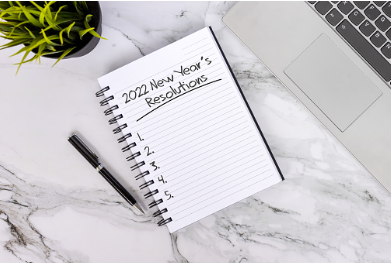
Every year it’s the same thing: the calendar is about to change, and you feel the need to plan to, too. This is the time to be goal setting, whether those are short-term goals or long-term goals. The truth is that a fresh calendar year and a culture of setting resolutions is a great excuse to set your intentions, but that doesn’t mean anything if you don’t actually want to make any changes. Do you believe in New Year’s Resolutions? Maybe you have seen them work out for other people, but you struggle to stick to them yourself, and you wonder how to make New Year’s Resolutions work? Do you often set goals for the new year but without any real plan of action for how to achieve them?
You may struggle with your “bad habits,” and year after year, find that you resolve to change them but can’t seem to achieve that change. Many of our most self-destructive behaviors began as a coping mechanism, making it difficult to unpack. That doesn’t mean that changing these behaviors is impossible; it just means that there may be more steps involved and more setbacks along the way.
Your goals may include making improvements to your mental health, your physical health, your spiritual self, your interpersonal relationships, your charitable habits, and more. You may have the best intentions, but be worried about your ability to follow through. Nobody can ever 100% guarantee reaching a goal, but there are key missteps that you can work to avoid when it comes to setting and crushing your goals in 2022.
Why Do New Year’s Resolutions Fail?
1. You make a goal without making a plan:
I genuinely believe that the New Year’s Resolutions fail because they are made when we are on the “high” of the beginning of the year. We make a goal when our motivation

is very high, we are excited about a fresh start, and people around us are also making resolutions. While envisioning our end result, we fail to consider how we would handle this goal when our motivation ultimately lessens (which is often much sooner than we think it will be). Rather than looking at the year as a whole, our current schedule, and reflecting on our past efforts, we decide our goal with no idea of logistics. How long will it reasonably take? Where can we fit it in? What actual concrete steps can we take? How will we handle setbacks?
2. The goal is too big or too vague:

Let’s be honest; we all make our resolutions about things that we have been struggling with for quite a while. Unfortunately, this can make the chances of us failing high because we are going after a goal that has a lot of meaning and significance for us. The pressure of the emotional stakes, combined with how our goal has grown year after year, can lead to us aiming for the impossible or somewhere in the vicinity of the impossible. Are you setting the same goals this year for the fifth year in a row? There is a difference between having high standards and setting yourself up to fail. A massive goal, like “Make a million dollars,” is highly unlikely if you’re currently earning five figures per year. Something like, “Account for and manage my finances better” has far more promise of success. “Create a budget based on my income and increase my savings” is another example.
Your New Year’s Resolution may also be too generic or vague. “Make more money” or “Get healthier” don’t offer any sort of scope; how much more money? By what measures would you consider yourself healthier? What steps can be taken to achieve these goals, and how do you know when you’ve reached them?
3. You get in your own way:
Your thoughts get in the way of you making a plan and going for it. You talk yourself out of following through; you come up with excuses or reasons why “it can wait until tomorrow.”

Worst of all, if you fall short of your goal today, you give up altogether. That’s the black-or-white thinking talking, and that sort of mindset is guaranteed to cut you off at the knees.
Whether you are in a negative mindset about the possibility of reaching your goals, the amount of work it might take, or your perceived worthiness to achieve them, if your thoughts aren’t positive, your outcome won’t be, either.
You may feel that you have a lot of obstacles to overcome between yourself and your goals; you might struggle to make a plan, be unsure of what you even want, or talk yourself down about your worthiness. No matter what it is you are trying to accomplish, it is important to cheer yourself on. This doesn’t mean that every day is easy or that you don’t stumble along the way. It doesn’t mean that you just believe without action or that you take action without belief. It means that you are in your own corner, knowing that you deserve to achieve your goals and dreams, no matter how challenging they may be. As you are considering your options, and making New Year’s Resolutions 2022 List, consider what your values are and envision the best possible outcome of setting these intentions.
3 Tips for Successful New Year’s Resolutions:
1. Make a plan:
It’s one thing to have an idea or goal, but it’s another to try to figure out how to get there and how to stay there. If your new year’s resolution is to be physically healthier, you have to decide what that means. You probably already know that your plan has to include figuring out your exercise routine; maybe you’ll have to sign up for classes. You might call that a plan, but that is technically just the first part of the plan. When I ask you to make a plan, I want you to address all the details: when, where, and how will you meet your goals? Because if you are adding something new to your routine, you have to be honest with yourself: where in your schedule will this new activity go? And what other measures of health will you look at? Physical health includes supporting your mental health, being hydrated, getting enough sleep, and eating foods that you enjoy that nourish your body.

As importantly: when you make a plan, you need to think about what will get in the way of you following through with your goal. You need to identify all of the ways you will fail. Yes, it might seem discouraging to start a New Year’s Resolution by thinking of all the ways you will fail; but the fact is over 70% of New Year’s Resolutions fail. To make sure you are not part of that statistic, you need to identify exactly what could get in your way. For example, let’s say your resolution is to spend less time on your phone. You will have to acknowledge that you spend a lot of time on your phone in the evening. Now we have identified evening as a trigger for failure.
You need to plan ahead and figure out how you will keep your phone away from yourself in the evenings. What will you do instead? A puzzle? Read a book? Go for a walk?
2. Know your “why:”
Knowing why you are setting this goal is going to be a big source of motivation for you. This is about keeping your goal personal. This is about knowing your intentions. The more specific a goal is to what you stand for, the more in line with your values a goal is, the stronger your motivation will be, and the simpler it will be to remain consistent.
A lot of people are prioritizing their mental health this year; this makes sense, given the past 21 months. Depression and anxiety are closing in on a lot of us. Isolation has been hard on people; keeping on top of the evolving health and safety protocols has been stressful. A goal to improve your mental health and peace of mind may make sense to you as you reflect on the last couple of years. Maybe you sheltered in place on your own and realized that you need a stronger relationship with yourself. Maybe you and a partner experienced relationship issues, and you want to unpack your part in them. Perhaps you grew apart from family and friends, and it took a toll on your feeling of well-being. All of these are focused reasons to prioritize your mental health, and they don’t even include issues outside the COVID-19 pandemic!
Knowing your “why” helps you to create a plan. If you want to “get fitter” but don’t have a concrete reason, where do you begin? However, if your goal is to be able to play longer with your kids or siblings or nieces and nephews, including running around, picking them up, tossing them around, etc., then you know you want to work on improving your cardiovascular stamina and your strength. From there, you may start going for walks or runs (depending on where you’re beginning and what is best for your body), and lifting weights, or doing weighted body exercises. Wanting to participate with the littles in your life is a great “why” because you know what that looks like and can envision the lifestyle changes that would help you.
3. Be your loudest cheerleader:

Recently, Mel Robbins was quoted saying, “No one is coming to save you. No one is coming to push you. It’s all up to YOU. You need to parent yourself if you want to make your dreams come true.”
This doesn’t mean that you can’t receive and appreciate the support from your loved ones. It means that you are your own constant companion. You hear your thoughts about yourself all day long; you talk to yourself more than you talk to any other person. The voice in your head can absolutely make or break your efforts. Commandeering that voice and changing it from a bully to a friend is essential if you want to pursue your ambitions.
Cheering yourself on also means being flexible about how your goals are evolving as you pursue them. You may initially set a health goal based on an arbitrary idea of what the goal might look like, then find that your life dramatically improves long before that date. If you are feeling strong and comfortable in your body, that is a fantastic achievement on its own! Don’t let your inner voice tell you that you’re a quitter if you don’t push yourself beyond what keeps you happy, healthy, and safe. Allow yourself to explore and revisit your original goals and decide if they were too big, just right, or not big enough; do this without judgment, but instead through mindfulness.
As you set your New Year’s Resolutions, the most important thing to consider is overall health, balance, and happiness. Rather than resolving to make a giant leap, resolve to make steady changes to your lifestyle and habits. Set smaller goals along the way toward your bigger goals, such as paying off one credit card, or walking one mile, then two, then three. Pay attention to your mind and body when you are working toward your goals.
When you are working toward something that is good for you, you can work hard without feeling miserable. If something you are doing in order to achieve your goal

feels like a punishment, revisit your goal and your “why” and try to come up with a gentler idea. You cannot sustain something that causes unnatural pain. Sore muscles after a workout are normal. Not being able to get out of bed is extreme. Adding more whole, unprocessed foods to your diet is a great idea; ignoring your hunger is not. Try to have as much fun with your goals as possible; not every New Year’s Resolution has to be serious. It can even keep you motivated to work on the more challenging stuff. Imagine looking at a list of goals, and nothing is checked off. Now envision that you are adding more and more checkmarks. If achieving three “fun” goals motivates you to work on a tough one, that’s not cheating. That’s a balanced life.
Take a look at what’s around you: have you picnicked at Malibu Creek State Park before? It’s within 10 miles of Woodland Hills. New Year’s Resolutions are meant to improve your life, so go ahead and build your own happiness! You deserve to.
Other Services at Embracing You Therapy
Here at Embracing You Therapy Group, we invite you to explore with us how life would be different if you had more control over your thoughts and emotions, and we invite you to consider that it is possible to accept things just as they are, embracing imperfections to create a gentler place for calm in your life.
Let’s learn what drives your unique perspective on anxiety and stress. Then, let’s find the tools-your unique tools-that help you respond to life in a healthy, calm way. Contact us today for your complimentary 15-minute phone consultation with one of our Client Care Coordinators.





